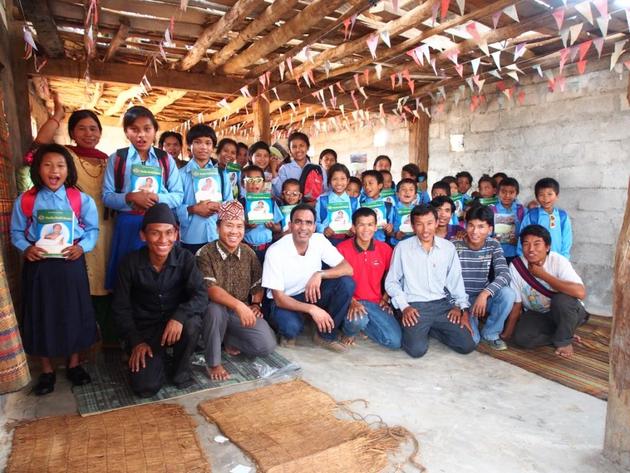
The Everest Region Project-Nepal also works in a joint collaboration with Masiha World Mission headed by Pastor Z. Matthew Suroya, a Presbyterian evangelist who resides in Nepal. The team consisted of myself, Pastor Matthew (from Punjab,India); Pastors Mithun, Lalit, Sandip, and Budi; and Elder Rajendra—all Nepalese from Makwanpur District—and Principal Tek (from Gorkha District).
The project takes place each year from March to April. Twenty-three of the children are from Hetauga, in Makwanpur District. This area of Nepal borders India and child trafficking is a problem. Lack of education and basic needs are predominant in the outlying villages. Hinduism and Buddhism are the major religions, with Christians forming a minority.
To the north of Nepal, in the village of Thumi, Gorkha., we have twelve children and two teachers are from Thumi, a small village nestled in the foothills of the Himalayas. All are blind, some are deaf, and three of the children are albinos.
(People with albinism are born with a deficiency of melanin pigmentation it is a health condition that affects one in 17,000 people in Nepal).
In these areas of Nepal, the former Maoist rebels have had a strong influence during Civil War What makes this unique is that the pastors in these districts are very active and having a lot of success in winning Nepalese to the Lord and helping them to cope with the physical hardships. Nepal has not had a stable government in several years, nor any welfare system to help the poor and needy, who are forced to depend on help from religious or secular charitable organizations. (The Nepalese Civil War (labelled the People's War by the Maoists was an armed conflict between government forces and Maoist fighters in Nepal which lasted from 1996 until 2006. The war was launched by the Communist Party of Nepal (Maoist) on 13 February 1996, with the aim of overthrowing the Nepalese monarchy and establishing a 'People's Republic'. It ended with the Comprehensive Peace Accord signed on 21 November 2006).
Starting in 2010 this is the fourth year we have been able to provide a steady and ongoing supply of shoes, schoolbooks, uniforms, and materials for the children. Each year, we see the number of requests increase. Christmas is a special time as we provide blankets for many children during our yearly blanket drive.
The ultimate objective is to provide a good well-rounded environment for the children’s spiritual and academic education to free them from living a life in the streets and the extreme poverty that in Nepal often opens the door to child trafficking. The ages of the children ranged from 5–13. The majority of them come from recently converted families from poor backgrounds.
My job was to oversee the project and confirm the donated funds were properly used to benefit the children for whom they were designated. Relying on the local pastors is a tremendous help, since they know their people and can see the need. I found it is important to ask questions, as misunderstandings can arise because of the language and culture barriers. Being there personally to oversee the project is vital, but leaving the locals to handle the footwork is also important and adds credibility.
Being open to suggestions and ideas is important. Being humble goes a long way and is sign of respect and care for those less fortunate who are already very appreciative and thankful for whatever help is given toward improving their children’s lives.
Here are some comments :
· I’m Lalit Bahadur from Makwanpur. For the last couple of years, your project has been helping our children, and we are heartily grateful to them.
· I’m Mithun Praja from a remote area of Makwanpur. Nobody used to come here to help our children but you came and helped them, so we are very thankful.
· My name is Rajendra Praja. Our area is very hilly, and it’s very hard to come here, but still, you help the children in this area every year, and we all in the villages are very happy and hope for their continued support.
· I’m Sandip, and I’m very thankful for helping these children. We come from poor families and are unable to give our children an education. But now with combined help of everyone , our children can get educated
Altogether, 37 children receive uniforms, books, shoes, belts, stationary, backpacks, and materials for a yearly course. As well as a lot of love and appreciation and encouragement, which money can never buy.
The Everest Region Project-Nepal also works in a joint collaboration with Masiha World Mission headed by Pastor Z. Matthew Suroya, a Presbyterian evangelist who resides in Nepal. The team consisted of myself, Pastor Matthew (from Punjab,India); Pastors Mithun, Lalit, Sandip, and Budi; and Elder Rajendra—all Nepalese from Makwanpur District—and Principal Tek (from Gorkha District).
The project takes place each year from March to April. Twenty-three of the children are from Hetauga, in Makwanpur District. This area of Nepal borders India and child trafficking is a problem. Lack of education and basic needs are predominant in the outlying villages. Hinduism and Buddhism are the major religions, with Christians forming a minority.
To the north of Nepal, in the village of Thumi, Gorkha., we have twelve children and two teachers are from Thumi, a small village nestled in the foothills of the Himalayas. All are blind, some are deaf, and three of the children are albinos.
(People with albinism are born with a deficiency of melanin pigmentation it is a health condition that affects one in 17,000 people in Nepal).
In these areas of Nepal, the former Maoist rebels have had a strong influence during Civil War What makes this unique is that the pastors in these districts are very active and having a lot of success in winning Nepalese to the Lord and helping them to cope with the physical hardships. Nepal has not had a stable government in several years, nor any welfare system to help the poor and needy, who are forced to depend on help from religious or secular charitable organizations. (The Nepalese Civil War (labelled the People's War by the Maoists was an armed conflict between government forces and Maoist fighters in Nepal which lasted from 1996 until 2006. The war was launched by the Communist Party of Nepal (Maoist) on 13 February 1996, with the aim of overthrowing the Nepalese monarchy and establishing a 'People's Republic'. It ended with the Comprehensive Peace Accord signed on 21 November 2006).
Starting in 2010 this is the fourth year we have been able to provide a steady and ongoing supply of shoes, schoolbooks, uniforms, and materials for the children. Each year, we see the number of requests increase. Christmas is a special time as we provide blankets for many children during our yearly blanket drive.
The ultimate objective is to provide a good well-rounded environment for the children’s spiritual and academic education to free them from living a life in the streets and the extreme poverty that in Nepal often opens the door to child trafficking. The ages of the children ranged from 5–13. The majority of them come from recently converted families from poor backgrounds.
My job was to oversee the project and confirm the donated funds were properly used to benefit the children for whom they were designated. Relying on the local pastors is a tremendous help, since they know their people and can see the need. I found it is important to ask questions, as misunderstandings can arise because of the language and culture barriers. Being there personally to oversee the project is vital, but leaving the locals to handle the footwork is also important and adds credibility.
Being open to suggestions and ideas is important. Being humble goes a long way and is sign of respect and care for those less fortunate who are already very appreciative and thankful for whatever help is given toward improving their children’s lives.
Here are some comments :
· I’m Lalit Bahadur from Makwanpur. For the last couple of years, your project has been helping our children, and we are heartily grateful to them.
· I’m Mithun Praja from a remote area of Makwanpur. Nobody used to come here to help our children but you came and helped them, so we are very thankful.
· My name is Rajendra Praja. Our area is very hilly, and it’s very hard to come here, but still, you help the children in this area every year, and we all in the villages are very happy and hope for their continued support.
· I’m Sandip, and I’m very thankful for helping these children. We come from poor families and are unable to give our children an education. But now with combined help of everyone , our children can get educated
Altogether, 37 children receive uniforms, books, shoes, belts, stationary, backpacks, and materials for a yearly course. As well as a lot of love and appreciation and encouragement, which money can never buy.
